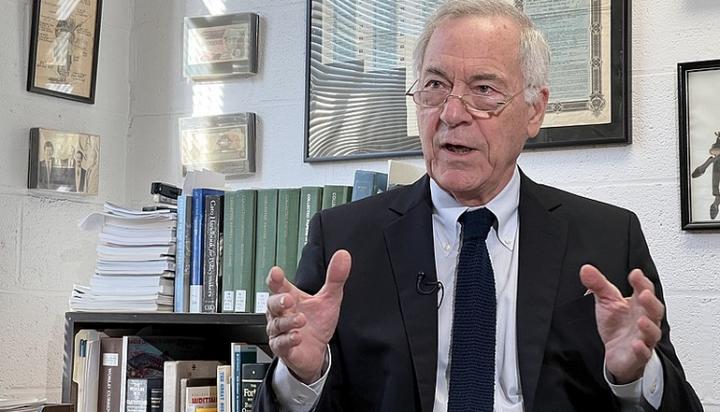News / National
Zimbabwe is heading towards economic armageddon, says America's Steve Hanke
13 Jun 2023 at 13:29hrs |
3 Views

Steve Hanke, a Professor of Applied Economics at The Johns Hopkins University in Baltimore, USA, has predicted a catastrophic downfall of the Zimbabwean economy describing its trajectory as "heading towards economic armageddon."
The country is in the middle of a severe economic downturn with an election set to be held in August this year.
Prices of basic commodities are skyrocketing every day in both the Zimbabwean dollar and US dollar.
The continuous devaluation of the local currency has eroded civil servants salaries and created a financial crisis that many believe can only be solved if the country resorts back to the US dollar as the official and only currency.
Hanke, who has been consistently urging the Zimbabwean authorities to dump the Zimdollar, said the country's inflation had reached an astonishing 194%/month.
Comparing the current situation to the hyperinflation of 2009, Hanke further pointed out that the situation in the country was pointing to a disaster.
"In Zimbabwe, the monthly inflation rate has doubled in the span of a day. It is now sitting at a stunning 194%/month. Zimbabwe is heading towards economic armageddon.
"Zimbabwe has officially entered into another episode of hyperinflation. Its monthly inflation rate has exceeded 50% for the last 30 days. Today, it sits at a whopping 194%. An avoidable disaster, if only Zimbabwe had officially dollarised, as it did from 2009-13," he said.
After the government liberalised the exchange of the Zimbabwean dollar against major currencies recently, it emerged that teachers, nurses and police officers' salaries could no longer buy 30 loaves of bread.
Bloomberg this week reported that International Monetary Fund had welcomed easing of the exchange rate by Zimbabwean authorities adding:
"However, the parallel rate continues to depreciate… A convergence of the official and unofficial exchange rates is possible if the authorities accelerate the liberalization of the foreign exchange market, address the Reserve Bank of Zimbabwe's quasi-fiscal operations to mitigate liquidity pressures and maintain an appropriately tight monetary policy stance to durably restore macroeconomic stability and ensure social stability."
The country is in the middle of a severe economic downturn with an election set to be held in August this year.
Prices of basic commodities are skyrocketing every day in both the Zimbabwean dollar and US dollar.
The continuous devaluation of the local currency has eroded civil servants salaries and created a financial crisis that many believe can only be solved if the country resorts back to the US dollar as the official and only currency.
Hanke, who has been consistently urging the Zimbabwean authorities to dump the Zimdollar, said the country's inflation had reached an astonishing 194%/month.
Comparing the current situation to the hyperinflation of 2009, Hanke further pointed out that the situation in the country was pointing to a disaster.
"In Zimbabwe, the monthly inflation rate has doubled in the span of a day. It is now sitting at a stunning 194%/month. Zimbabwe is heading towards economic armageddon.
"Zimbabwe has officially entered into another episode of hyperinflation. Its monthly inflation rate has exceeded 50% for the last 30 days. Today, it sits at a whopping 194%. An avoidable disaster, if only Zimbabwe had officially dollarised, as it did from 2009-13," he said.
After the government liberalised the exchange of the Zimbabwean dollar against major currencies recently, it emerged that teachers, nurses and police officers' salaries could no longer buy 30 loaves of bread.
Bloomberg this week reported that International Monetary Fund had welcomed easing of the exchange rate by Zimbabwean authorities adding:
"However, the parallel rate continues to depreciate… A convergence of the official and unofficial exchange rates is possible if the authorities accelerate the liberalization of the foreign exchange market, address the Reserve Bank of Zimbabwe's quasi-fiscal operations to mitigate liquidity pressures and maintain an appropriately tight monetary policy stance to durably restore macroeconomic stability and ensure social stability."
Source - Nehanda Radio
Join the discussion
Loading comments…




































